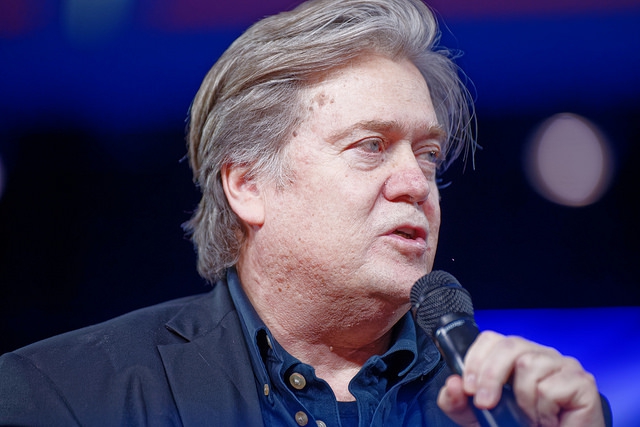Key to Bannon's dismay is the fact that Donald Trump was never supposed to be a "mainstream" politician. Trump's cachet among his base resided in his ability to separate himself from the so-called sophisticated, Wall-Street dominated elites that control both political parties in the US. Despite his billionaire position and upbringing as a crass racist, Trump could be relied upon to challenge official dogma in Washington. In his campaign, he derided corporations for sending jobs outside of the US and criticized regime change wars. And his rhetoric led to action. The Trump Administration threw out the controversial TPP free-trade agreement and ended CIA-sponsored funding to terrorists in Syria, much to the chagrin of both political parties.
Barely a week after Bannon's departure, President Trump announced that the US occupation of Afghanistan would continue indefinitely. Trump appeared uncomfortable with the decision. His nationally televised announcement was peppered with promises that the costs of war would not be leveled on the American people and that the escalation was no "blank check." Yet the decision to escalate in Afghanistan is but one example of how the Trump Administration has capitulated o the War apparatus in Washington. The US �coalition� continued its bombing campaign in Syria and Iraq with as much fervor as the prior Administration. In April, Trump authorized the use of the largest non-nuclear bomb in US history on Afghanistan. He then ratcheted up tensions with the DPRK by transferring THADD missiles to Seoul.
These decisions were made in the midst of a hostile political environment. Trump has been targeted by what observers call the "Deep State" for his alleged ties to Russia. The "Deep State" includes US intelligence agencies, military officials, and political statesmen who wield influence over the state and render democratic institutions obsolete. Many have come to believe that the Deep State manipulates politics in favor of the US military and corporate elite regardless of who occupies the Oval Office. It can be inferred that the Deep State's influence over Trump in part led to Bannon's conclusion that the Administration, as he knew it, had unofficially ended following his resignation.
The reality of the situation is that Donald Trump's mere signal toward Russia that his Administration would be interested in easing relations sent the ruling class into imperial madness. Every foreign policy decision made by the Administration since has been carefully graded by the ruling class. Trump was applauded for his decision to lob bombs at a Syrian airbase in the Spring. US intelligence denounced Trump for ending covert aid to the so-called rebels in Syria. His recent announcement to increase troop presence in Afghanistan has been met with mixed criticism, in part because he failed to give specific details on just how he would �win� the war.
The New York Times and Fox News praised Trump's speech, but urged him to come forward with a concrete plan. Rewind back to about two weeks ago, and the tone was much different. Senator John McCain reprimanded Trump for his lack of strategy in Afghanistan. The cancer-ridden Senator suggested a troop increase of 8,400 with little to no criticism from either of the established parties. His request was informed by recent news that the Taliban had taken control of nearly fifty percent of Afghanistan. McCain's appeal placed significant pressure on Trump to escalate a war that he had vocally opposed in the past.
It appears that without Bannon, there are no voices in the current Administration willing to stand up to the US foreign policy establishment. Bannon was the only remaining voice in the White House cautioning against increased war provocations with the DPRK and Russia. He was also likely the mastermind behind Trump's opposition to the TPP and corporate free-trade agreements generally. The Pentagon cited the Trump Administration's "economic nationalism" as an impediment to revitalizing US military strategy in the world. Whatever one thinks of Bannon, his departure represents a significant blow to the Trump fraction of the internal struggle currently being waged in Washington.
Many on the so-called left in the US will see these words as a defense of Bannon and Trump's racism and bigotry. Such criticism misses the larger significance of what is occurring in Washington and US society generally. A steady decay in the economic and political legitimacy of the US has led to the current era of Trump. Trump and Bannon's white supremacist worldview is problematic and rightfully condemned by a large number of people in the US. However, the struggle of the so-called Deep State and the Democratic Party to neutralize the Trump Administration on the basis of differences in foreign policy places an immediate threat to humanity as a whole.
As Trump further capitulates to the US foreign policy establishment, Bannon's words become increasingly relevant to the political moment that we find ourselves in. Afghanistan's predicament is a product of the Wall Street interests that control the foreign policy establishment, not least because the Middle East nation sits on top of over a trillion dollars� worth of minerals and serves as the source of the opioid trade. The Pentagon and US intelligence understand clearly that Russia and China are eagerly awaiting the day they can freely integrate Afghanistan into their broader economic agenda, an agenda that opposes unquestioned US hegemony in the world. Since day one, Trump was caught between the struggle to maintain US domination in the face of decline. This struggle is much bigger than Trump's individual political or business career, as the end result will determine the future of the US ruling system in its totality.
# Tags











